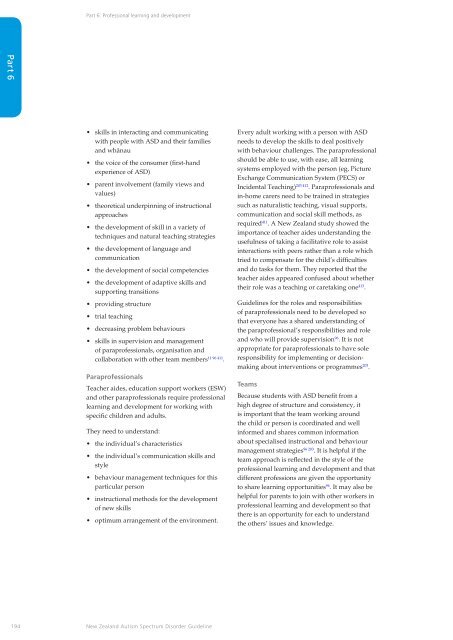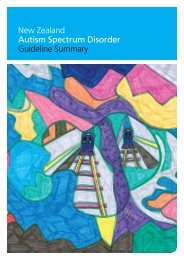New Zealand Autism Spectrum Disorder Guideline - Ministry of Health
New Zealand Autism Spectrum Disorder Guideline - Ministry of Health
New Zealand Autism Spectrum Disorder Guideline - Ministry of Health
You also want an ePaper? Increase the reach of your titles
YUMPU automatically turns print PDFs into web optimized ePapers that Google loves.
Part 6: Pr<strong>of</strong>essional learning and development<br />
Part 6<br />
• skills in interacting and communicating<br />
with people with ASD and their families<br />
and whänau<br />
• the voice <strong>of</strong> the consumer (first-hand<br />
experience <strong>of</strong> ASD)<br />
• parent involvement (family views and<br />
values)<br />
• theoretical underpinning <strong>of</strong> instructional<br />
approaches<br />
• the development <strong>of</strong> skill in a variety <strong>of</strong><br />
techniques and natural teaching strategies<br />
• the development <strong>of</strong> language and<br />
communication<br />
• the development <strong>of</strong> social competencies<br />
• the development <strong>of</strong> adaptive skills and<br />
supporting transitions<br />
• providing structure<br />
• trial teaching<br />
• decreasing problem behaviours<br />
• skills in supervision and management<br />
<strong>of</strong> parapr<strong>of</strong>essionals, organisation and<br />
collaboration with other team members 11 96 411 .<br />
Parapr<strong>of</strong>essionals<br />
Teacher aides, education support workers (ESW)<br />
and other parapr<strong>of</strong>essionals require pr<strong>of</strong>essional<br />
learning and development for working with<br />
specific children and adults.<br />
They need to understand:<br />
• the individual’s characteristics<br />
• the individual’s communication skills and<br />
style<br />
• behaviour management techniques for this<br />
particular person<br />
• instructional methods for the development<br />
<strong>of</strong> new skills<br />
• optimum arrangement <strong>of</strong> the environment.<br />
Every adult working with a person with ASD<br />
needs to develop the skills to deal positively<br />
with behaviour challenges. The parapr<strong>of</strong>essional<br />
should be able to use, with ease, all learning<br />
systems employed with the person (eg, Picture<br />
Exchange Communication System (PECS) or<br />
Incidental Teaching) 203 412 . Parapr<strong>of</strong>essionals and<br />
in-home carers need to be trained in strategies<br />
such as naturalistic teaching, visual supports,<br />
communication and social skill methods, as<br />
required 411 . A <strong>New</strong> <strong>Zealand</strong> study showed the<br />
importance <strong>of</strong> teacher aides understanding the<br />
usefulness <strong>of</strong> taking a facilitative role to assist<br />
interactions with peers rather than a role which<br />
tried to compensate for the child’s difficulties<br />
and do tasks for them. They reported that the<br />
teacher aides appeared confused about whether<br />
their role was a teaching or caretaking one 413 .<br />
<strong>Guideline</strong>s for the roles and responsibilities<br />
<strong>of</strong> parapr<strong>of</strong>essionals need to be developed so<br />
that everyone has a shared understanding <strong>of</strong><br />
the parapr<strong>of</strong>essional’s responsibilities and role<br />
and who will provide supervision 96 . It is not<br />
appropriate for parapr<strong>of</strong>essionals to have sole<br />
responsibility for implementing or decisionmaking<br />
about interventions or programmes 203 .<br />
Teams<br />
Because students with ASD benefit from a<br />
high degree <strong>of</strong> structure and consistency, it<br />
is important that the team working around<br />
the child or person is coordinated and well<br />
informed and shares common information<br />
about specialised instructional and behaviour<br />
management strategies 96 203 . It is helpful if the<br />
team approach is reflected in the style <strong>of</strong> the<br />
pr<strong>of</strong>essional learning and development and that<br />
different pr<strong>of</strong>essions are given the opportunity<br />
to share learning opportunities 96 . It may also be<br />
helpful for parents to join with other workers in<br />
pr<strong>of</strong>essional learning and development so that<br />
there is an opportunity for each to understand<br />
the others’ issues and knowledge.<br />
194<br />
<strong>New</strong> <strong>Zealand</strong> <strong>Autism</strong> <strong>Spectrum</strong> <strong>Disorder</strong> <strong>Guideline</strong>











